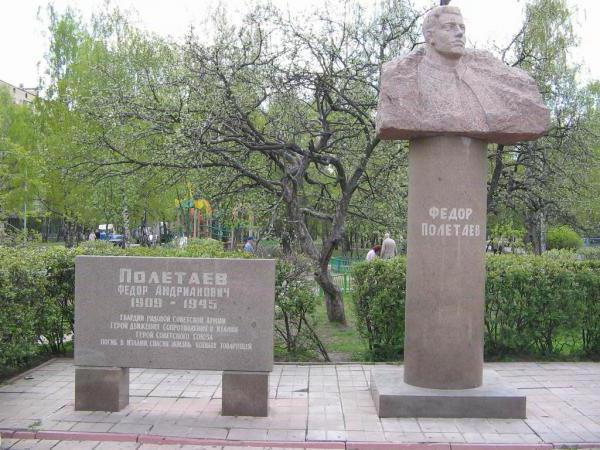An ordinary person from the village of the Ryazan region, Fedor Poletaev, is a hero of Italy and the Soviet Union. And in this article we will talk about his interesting fate, which made him famous.
Family life
The village of Katino is the small homeland of Fedor. He was born in an ordinary peasant family and, like many people at that time, received only a primary education. In 1923, Fedor worked in the Moscow Region, in the village of Elektroperedacha, located in the Pavlovo-Posad district, on peat extraction. His first profession is a loader. After 6 years, he met Maria Nikanorovna Kalinina, who became his wife. With her, he returned to his homeland in 1931. The couple had a daughter, Catherine and son Michael.
In the fall of 1931, Fedor Poletaev was drafted into the army. After serving, as expected, two years in the Moscow Proletarian Rifle Division, he was demobilized. Fedor Poletaev returned to the citizen, already having the profession of a blacksmith.
The family moved to the village of Staromyshastovskaya in the Kuban. But in 1935, the Poletaevs returned to the village of Katino, where they lost their son due to illness. The daughter was also seriously ill. The disease caused complications, and until the end of her life Catherine did not hear and did not speak. But the Poletaev family replenished again. From 1936 to 1940 they had three children - Mikhail, Valentina and Nikolai.
Military routine
The Patriotic War began, the head of the family was mobilized. The soldier Fedor Poletaev was in the 28th Guards Artillery Regiment, belonging to the 9th Guards Division. At the beginning of his service he took part in the battle for Moscow, and also in military operations on the Don (spring-summer 1942). In June 1942, when Soviet troops escaped from the siege near Leninka, Fedor Poletaev was wounded. His biography was replenished with several interesting facts. It can be said that his former life ended, and a completely new one began, which did not continue his previous fate.
In that battle, Fedor Poletaev was seriously wounded in the leg and was carried by his comrades from the battlefield. Then it was treated for three months. For such a long time, our troops went far from the village of Leninka, and Fedor decided to catch up with his own. But to do this was no longer easy. Policemen snooped around, and although he managed to cross the front line, he was caught by them. Fedor did not despair and tried to escape, but he was again seized and sent to the camp. During his life, he had to visit more than one concentration camp. Berdichev, Vyazma, Mielec became for a time his place of stay. People in captivity strove for freedom. Probably those who did not lose heart were able to survive in terrible conditions. But Fedor Poletaev, whose photo is presented in this article, even managed to escape with a group of comrades from the camp, which was located near the town of Slavonski Brod in March 1944.
Happy salvation
However, he could not go far, and he was again sent to prison. This time to an Italian camp near Genoa. And yet, in the summer of 1944, Fedor again tried to escape. This time the attempt was successful, and he joined a group of Italian partisans led by Nino Franchi. The detachment, with the members of which he was later fortunate enough to fight against the Nazis in the area of Genoa - Sarravale - Scrivia, was called "Orestes" and belonged to the Pinan Chicero division.
Hero's death
Luck left Fedor Poletaev in 1945. It happened near the small town of Cantalupo in Valle Scrivia. Here the German invaders staged a punitive operation. They received reinforcements in the form of the Turkestan Legion. Although the partisans managed to turn the tide of hostilities and go on the offensive, the Nazis did not intend to surrender. The first to attack was Fedor Poletaev, pouring bullets from an assault rifle at the enemy, followed by the entire battalion. The Nazis were forced to retreat. They were close to surrendering, but some of them were still shooting back. One bullet pierced Fedor's throat, and he died. Initially, he was buried in Roquetta, but after the war the ashes were transferred to Genoa at the Staleno cemetery. The memory of Fedor Poletaev is honored in Italy to this day. Although there is more known his nickname - Poet. That's what the partisans called him. Monuments to the Russian soldier, who valiantly fought against the Nazis, are in Genoa and Cantalupo Ligure. An Italian oil tanker is also named after him. He was posthumously awarded the gold medal “For Military Valor” and a five-pointed bronze star in 1947. Not all Italians possess such insignia. And in the Soviet Union they learned about his heroic life only a few decades after the war.

Justice restoration
Initially, he was considered dead under the village of Leninka and buried in a mass grave. He was then sought as a traitor and deserter. When Poletaev’s awards were handed over to the Soviet consul of our country in 1947, confusion with the names arose. Indeed, in the Italian order it was written not Poletaev, but Poet. December 26, 1962 was a significant date. It was on this day that Fedor Poletaev was awarded the title (posthumously) of the Hero of the Soviet Union. This would have been impossible if it were not for the interest of the writer Smirnov in historical photographs and documents. Sergey Sergeevich was able to prove that Fedor Poletaev and Poetan are one and the same person.
The main thing is that the award found its hero. In our country, monuments were erected in his honor, streets were named. So, Fyodor Poletaev, the hero of the two countries, is remembered, known, and, of course, honored by his feat.